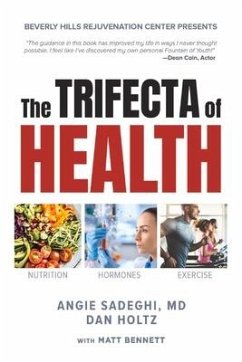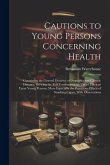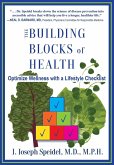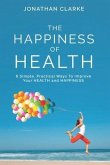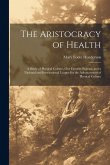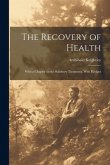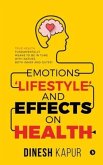18,99 €
inkl. MwSt.
Versandfertig in über 4 Wochen

9 °P sammeln
- Broschiertes Buch
- Merkliste
- Auf die Merkliste
- Bewerten Bewerten
- Teilen
- Produkt teilen
- Produkterinnerung
- Produkterinnerung
Advancing mental and physical deterioration are not inevitable consequences of the aging process. By combining bioidentical hormone replacement therapy with a plant-based diet plan and sensible exercise programs, the Beverly Hills Rejuvenation Centers' Trifecta of Health protocols provide authentic viable answers to our most pressing health challenges.Should our life's goal be to reach old age, or to actually enjoy it? In the Trifecta of Health, renowned gastroenterologist Dr. Angie Sadeghi and health expert Dan Holtz provide actionable, innovative guidance on diet, hormone rebalancing, and…mehr
Andere Kunden interessierten sich auch für
![Keep It Simple Health: Volume 1 Keep It Simple Health: Volume 1]() Colby RossKeep It Simple Health: Volume 110,99 €
Colby RossKeep It Simple Health: Volume 110,99 €![Cautions to Young Persons Concerning Health: Containing the General Doctrine of Dyspepsia and Chronic Diseases, Shewing the Evil Tendency of the Use o Cautions to Young Persons Concerning Health: Containing the General Doctrine of Dyspepsia and Chronic Diseases, Shewing the Evil Tendency of the Use o]() Benjamin WaterhouseCautions to Young Persons Concerning Health: Containing the General Doctrine of Dyspepsia and Chronic Diseases, Shewing the Evil Tendency of the Use o18,99 €
Benjamin WaterhouseCautions to Young Persons Concerning Health: Containing the General Doctrine of Dyspepsia and Chronic Diseases, Shewing the Evil Tendency of the Use o18,99 €![The Building Blocks of Health: How to Optimize Your Wellness with a Lifestyle Checklist The Building Blocks of Health: How to Optimize Your Wellness with a Lifestyle Checklist]() J. Joseph SpeidelThe Building Blocks of Health: How to Optimize Your Wellness with a Lifestyle Checklist30,99 €
J. Joseph SpeidelThe Building Blocks of Health: How to Optimize Your Wellness with a Lifestyle Checklist30,99 €![The Happiness of Health: 6 Simple, Practical Ways To Improve Your HEALTH and HAPPINESS The Happiness of Health: 6 Simple, Practical Ways To Improve Your HEALTH and HAPPINESS]() Jonathan ClarkeThe Happiness of Health: 6 Simple, Practical Ways To Improve Your HEALTH and HAPPINESS20,99 €
Jonathan ClarkeThe Happiness of Health: 6 Simple, Practical Ways To Improve Your HEALTH and HAPPINESS20,99 €![The Aristocracy of Health: A Study of Physical Culture, Our Favorite Poisons, and a National and International League for the Advancement of Phys The Aristocracy of Health: A Study of Physical Culture, Our Favorite Poisons, and a National and International League for the Advancement of Phys]() Mary Foote HendersonThe Aristocracy of Health: A Study of Physical Culture, Our Favorite Poisons, and a National and International League for the Advancement of Phys37,99 €
Mary Foote HendersonThe Aristocracy of Health: A Study of Physical Culture, Our Favorite Poisons, and a National and International League for the Advancement of Phys37,99 €![The Recovery of Health: With a Chapter on the Salisbury Treatment, With Recipes The Recovery of Health: With a Chapter on the Salisbury Treatment, With Recipes]() Archibald KeightleyThe Recovery of Health: With a Chapter on the Salisbury Treatment, With Recipes26,99 €
Archibald KeightleyThe Recovery of Health: With a Chapter on the Salisbury Treatment, With Recipes26,99 €![Emotions 'Lifestyle' and Effects on Health: True Health Fundamentally Means to Be in Tune with Nature, Both Inner and Outer! Emotions 'Lifestyle' and Effects on Health: True Health Fundamentally Means to Be in Tune with Nature, Both Inner and Outer!]() Dinesh KapurEmotions 'Lifestyle' and Effects on Health: True Health Fundamentally Means to Be in Tune with Nature, Both Inner and Outer!24,99 €
Dinesh KapurEmotions 'Lifestyle' and Effects on Health: True Health Fundamentally Means to Be in Tune with Nature, Both Inner and Outer!24,99 €-
-
-
Advancing mental and physical deterioration are not inevitable consequences of the aging process. By combining bioidentical hormone replacement therapy with a plant-based diet plan and sensible exercise programs, the Beverly Hills Rejuvenation Centers' Trifecta of Health protocols provide authentic viable answers to our most pressing health challenges.Should our life's goal be to reach old age, or to actually enjoy it? In the Trifecta of Health, renowned gastroenterologist Dr. Angie Sadeghi and health expert Dan Holtz provide actionable, innovative guidance on diet, hormone rebalancing, and exercise to help us all turn back the hands of time and live healthier more vital lives. From weight loss to reducing (or even eliminating) pharmaceutical dependency, from increasing overall strength and energy to combating our most feared diseases, the lifestyle, nutritional and science-based insights in this book can make the difference between merely surviving and thriving as we grow old.
Hinweis: Dieser Artikel kann nur an eine deutsche Lieferadresse ausgeliefert werden.
Hinweis: Dieser Artikel kann nur an eine deutsche Lieferadresse ausgeliefert werden.
Produktdetails
- Produktdetails
- Verlag: Amazon Digital Services LLC - Kdp
- Seitenzahl: 192
- Erscheinungstermin: 15. Oktober 2019
- Englisch
- Abmessung: 228mm x 153mm x 15mm
- Gewicht: 311g
- ISBN-13: 9780578570617
- ISBN-10: 0578570610
- Artikelnr.: 57825233
- Herstellerkennzeichnung
- Libri GmbH
- Europaallee 1
- 36244 Bad Hersfeld
- 06621 890
- Verlag: Amazon Digital Services LLC - Kdp
- Seitenzahl: 192
- Erscheinungstermin: 15. Oktober 2019
- Englisch
- Abmessung: 228mm x 153mm x 15mm
- Gewicht: 311g
- ISBN-13: 9780578570617
- ISBN-10: 0578570610
- Artikelnr.: 57825233
- Herstellerkennzeichnung
- Libri GmbH
- Europaallee 1
- 36244 Bad Hersfeld
- 06621 890
Dr. Angie Sadeghi, known as Dr. Angie to her friends and many followers, is a diplomate of the American Board of Internal Medicine and the American Board of Gastroenterology. She has overcome several health challenges throughout her life that started in childhood. She has decided to share her story and her success so that others can enjoy the gift of true, lasting health.Dr. Angie grew up with a mother who was obese and didn't understand basic nutrition. When Angie was in high school, she was overweight and concerned about her appearance. She talked to her mother about it, who told her not to worry, that she could eat whatever she wanted as long as she exercised.Dr. Angie took her mother at her word and ate what most teenagers eat: Snickers bars, McDonald's burgers, and fries--all kinds of unhealthy foods. And she worked out vigorously. (In fact, she still belongs to the same gym she joined back in the '80s.) She would hit the gym hard for an hour a day, but her weight wouldn't budge. In fact, her legs were rubbing together, causing sores and lasting hyperpigmentation to develop on the insides of her thighs.Dr. Angie was self-conscious and anxious to try any diet that came around, including the Atkins diet. "I had read the book and was so excited," she says. "I was convinced that low-carb diets worked and that I was going to lose weight before my upcoming wedding." And she did. But she also started having back pain and kidney issues, likely due to the excess protein load on her kidneys. The skin on her chin began to darken, and she developed hormonal imbalances. She couldn't concentrate. She got thin, but also unhealthy, depressed, and fatigued.Dr. Angie knew intuitively that the Atkins diet was the problem, so she stopped. But she was now as confused about nutrition as the rest of America. She decided to stop dieting altogether and went back to eating the standard American diet. This led to more health problems, including being overweight--again.In addition to her weight challenges, Dr. Angie had spent forty years of her life with itchy skin, calming it with Benadryl and cortisone cream. At times, it was so bad she couldn't sleep because of the itching on her legs, hands, and bottoms of her feet. The eczema also caused pustules on her hands, which made her self-conscious when she met with patients and shook their hands.In 2014, she began researching and studying nutrition, and what she learned opened her eyes to a new way of living. She decided to make major lifestyle changes and move to a plant-based diet. The results were miraculous. In nine months, she shed weight and transformed her body. Her cholesterol went down, and after just one week on the plant-based diet, her lifelong eczema went away. That alone was life changing."It makes perfect sense, if you think about it," she explains. "The casein in dairy is highly inflammatory and is linked to many health problems, so it makes sense that it causes, or at least worsens, eczema. Yet most doctors will give you the standard treatment of Benadryl and corticosteroid cream instead of getting to the root of the issue, which is often dairy."Dr. Angie realized she had come across the most incredible diet in the world. By switching to a whole-food, plant-based diet, she was eating plenty of food, wasn't worrying about portions, and never felt overly hungry. Best of all, she was getting lots of fiber, healthy proteins, and more nutrients than ever. "I wasn't limiting my portions because when you're eating plant-based, you're getting lots of fiber, and since the food is not calorically dense, you don't have to limit your portions," she explains. Suddenly, the self-conscious chubby girl was the hot doctor. More than once, people at the gym confused her for a fitness model. "It was crazy," she says. "I had lived forty years of my life overweight, then one day I woke up and looked totally different. It was hard not to think, 'Wow, look at me.' I just wasn't used to it."Daniel Holtz founded Beverly Hills Rejuvenation Center (BHRC) because of a combination of personal health concerns and divine intervention. When Dan was in his late thirties, he was suffering from multiple seemingly unrelated health issues. He had a stiff back and neck, achy knees and hips, several sciatic nerve issues, erectile dysfunction, and dry, patchy skin on his knuckles and the bottoms of his feet. He had also lost twenty pounds of muscle over a two-year period.Dan had a lot of trouble getting to sleep and staying asleep. As a result, he suffered from fatigue and relied on caffeinated drinks to make it through the day. He started questioning why his energy was so depleted and wondered if there might be a solution for his many afflictions. To further aggravate his situation, Dan was depressed. He felt like his life was empty, flat, and uninteresting. He was emotionally dead inside, regardless of what was going on in his life. In short, he was falling apart physically, emotionally, and mentally.Surprisingly, throughout this challenging period of his life, Dan was able to operate a construction company and even muster the energy to occasionally race NASCAR-style stock cars. One day, when he was racing in Phoenix, Arizona, he was injured in a very bad crash. He was airlifted to the hospital and remained in a coma for an extended period of time. When he finally woke up, his very first thought was that he wished he had died.When he got out of the hospital, Dan decided he could not continue living the way he had been and would not stop until he figured out what was wrong and how to treat it. He saw various physicians, told them about his many different health complaints, and asked them to run a thorough series of tests. The results always came back normal, but Dan challenged the doctors to dig deeper and run more tests, including tests to measure hormone levels. These more advanced tests yielded results that were technically within the reference range of normal but were on the low side. In fact, they were collectively low enough to cause many of the negative symptoms he was experiencing.Dan sought guidance from a wide variety of doctors, including endocrinologists and urologists, but to no avail. At his wits' end, he decided to do some research on his own. He started reading about hormones online and quickly found an enlightening study. Researchers had tested the testosterone levels of ten 40-year-old females and ten 40-year-old males and found that all of these middle-aged subjects had about half the testosterone of people in their twenties. It hit Dan that his decline in health and attitude was an aging issue, not some weird personal quirk. It wasn't due to having been in a coma, pituitary issues, or some other malady. Instead, many of Dan's problems appeared to be part of the normal aging process--and shockingly, few of the professionals he had seen had recognized it.
